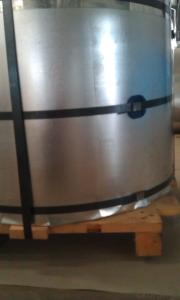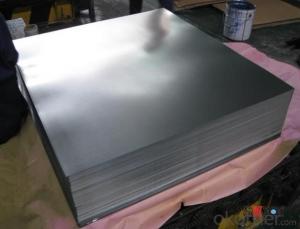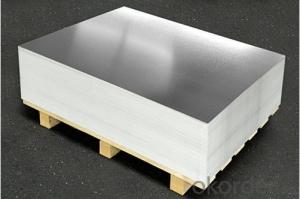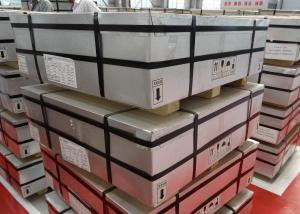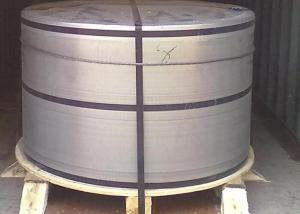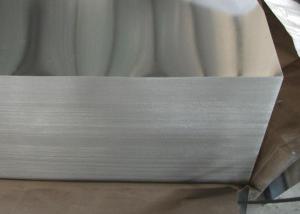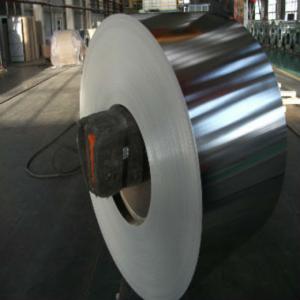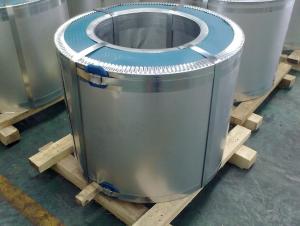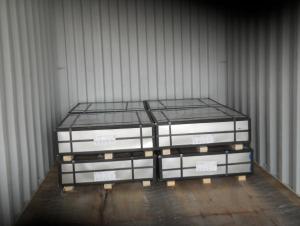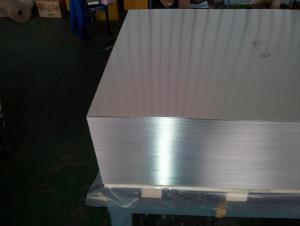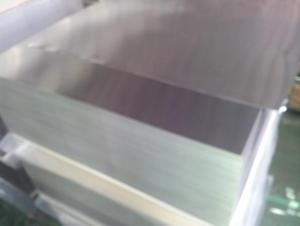Quality Tin Free Steel TFS
- Loading Port:
- China Main Port
- Payment Terms:
- TT OR LC
- Min Order Qty:
- -
- Supply Capability:
- -
OKorder Service Pledge
OKorder Financial Service
You Might Also Like
Tin Free Steel (TFS)
Is also known as chromed steel, as it is obtained by coating the metal base (low-carbon steel) with an ultra-thin layer of metallic chrome and then with a chromium oxide layer.This steel product was developed to meet economic requirements, and excels tinplate in paintability, paint adhesion, and economy. It is widely used for making beverage cans and 18-liter cans. It is also used for making photographic film cases and as a protective material for optical fiber cables.
Our TFS Specification:
Standard: AISI, ASTM, BS, DIN, GB, JIS
Material: MR,SPCC
Thickness:0.15mm - 0.45mm
Width: 600mm -1150mm
Temper: T1-T5
Annealing: BA & CA
Coil Inner Diameter: 508mm
Weight: 6-10 tons/coil 1~1.7 tons/sheets bundle
Oil: DOS
Surface: Finish,bright,stone,matte,silver
Packing:
1、For sheets: plastic or waterproof paper, metallic cover and angles, steel strips,wooden pallet.
2、For Coils: plastic or waterproof paper,plastic protect plate,steel strips.
Both Prime and Second Quality Are Available!!!
- Q:Can tinplate be used for military applications?
- Yes, tinplate can be used for military applications. Tinplate, which is coated with a thin layer of tin to prevent corrosion, offers excellent durability and protection against rust. This makes it suitable for various military equipment and supplies such as ammunition cans, food containers, and other storage solutions. Additionally, tinplate is a cost-effective material that can withstand harsh environments and provide long-lasting performance, making it a reliable choice for military applications.
- Q:Can tinplate be used for storage containers?
- Yes, tinplate can be used for storage containers. Tinplate is a type of steel coated with a thin layer of tin, which provides it with corrosion resistance and durability. This makes it suitable for storing a wide range of products, including food, beverages, chemicals, and cosmetics. Tinplate containers are commonly used in the packaging industry for their ability to maintain the quality and freshness of the stored items.
- Q:What are the main applications of tinplate in the photography industry?
- Tinplate is commonly used in the photography industry for producing photographic plates, which are used in traditional film cameras. These plates are coated with a light-sensitive emulsion and exposed to light to capture images. Additionally, tinplate is used for making tin cans to store and protect photographic film and other sensitive materials, ensuring their longevity and preservation.
- Q:How is tinplate used in the packaging industry?
- Tinplate is commonly used in the packaging industry as it provides a protective and durable coating for various products. It is often used to create cans and containers for food, beverages, and other consumer goods. Tinplate ensures the preservation of the contents, prevents contamination, and extends shelf life. Additionally, its versatility allows for easy printing and labeling, making it an ideal choice for branding and marketing purposes.
- Q:Is tinplate magnetic?
- Yes, tinplate is magnetic.
- Q:How does tinplate perform in terms of light protection?
- Tinplate performs well in terms of light protection due to its opaque nature, which helps to block out light and prevent the entry of harmful UV rays.
- Q:How is tinplate coated with epoxy resin?
- Tinplate is typically coated with epoxy resin through a process known as electrostatic spraying or electrodeposition. In this process, the tinplate is first cleaned and pre-treated to ensure proper adhesion. Then, a positively charged tinplate is immersed in an epoxy resin bath containing negatively charged epoxy particles. The resin particles are attracted to the tinplate surface and adhere electrostatically, forming a uniform coating. The coated tinplate is then cured at high temperatures to harden the epoxy resin, resulting in a durable and corrosion-resistant finish.
- Q:How is tinplate affected by exposure to oxygen?
- Tinplate is generally not affected by exposure to oxygen, as it forms a protective layer of tin oxide on its surface that prevents further oxidation.
- Q:How does tinplate compare to aluminum packaging in terms of cost?
- Tinplate packaging generally tends to be more cost-effective compared to aluminum packaging. Tinplate is a durable material that is made from thin sheets of steel coated with a layer of tin, making it a cost-efficient option for packaging. On the other hand, aluminum packaging is lightweight and provides excellent barrier properties, but it is typically more expensive due to the higher cost of aluminum as a raw material.
- Q:How does tinplate affect the shelf life of products?
- Tinplate can significantly extend the shelf life of products due to its properties such as resistance to corrosion, airtightness, and light-blocking abilities. It forms a protective barrier that prevents contact with oxygen, moisture, and other external factors that can cause spoilage or degradation. This helps maintain the quality and freshness of the products, ultimately increasing their shelf life.
1. Manufacturer Overview |
|
|---|---|
| Location | |
| Year Established | |
| Annual Output Value | |
| Main Markets | |
| Company Certifications | |
2. Manufacturer Certificates |
|
|---|---|
| a) Certification Name | |
| Range | |
| Reference | |
| Validity Period | |
3. Manufacturer Capability |
|
|---|---|
| a)Trade Capacity | |
| Nearest Port | |
| Export Percentage | |
| No.of Employees in Trade Department | |
| Language Spoken: | |
| b)Factory Information | |
| Factory Size: | |
| No. of Production Lines | |
| Contract Manufacturing | |
| Product Price Range | |
Send your message to us
Quality Tin Free Steel TFS
- Loading Port:
- China Main Port
- Payment Terms:
- TT OR LC
- Min Order Qty:
- -
- Supply Capability:
- -
OKorder Service Pledge
OKorder Financial Service
Similar products
New products
Hot products
Related keywords
